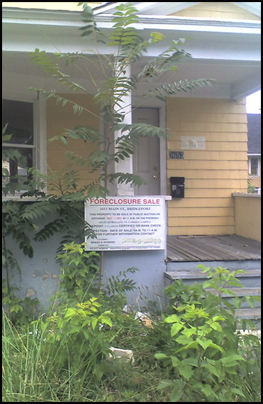
Prevention is always better than the cure, and homelessness is no exception to that rule. The Neighborhood Stabilization Initiative (NSI) takes a multi-pronged approach to homelessness prevention. It’s all about eliminating barriers that keep people from fully participating in our society, whether politically, economically, or in any other way.
The people behind this initiative see a lot of racial bias underneath the subprime mortgage crisis, and aim to do something about it. They want to see more sustainable credit options for low-income borrowers, especially ethnic minorities. The NSI’s website says,
[…O]pportunities for homeownership are closely linked to wealth creation and financial security, particularly for African American and Latino households. The current subprime and foreclosure crisis threatens to reverse the substantial gains in minority homeownership that the country has witnessed in recent decades.
Rather than just dealing with the tattered victims of the system, the NSI intends to reform the system. Right now, change is needed in order to create sustainable home ownership. Change is needed to prevent repetition of the circumstances that have brought America to such a sorry condition. Plenty of damage control needs to be done now, and a whole lot has to be accomplished in a short time to keep even more damage from needing to be controlled later.
Another page on the NSI website explains one of the big difficulties with the subprime lending and foreclosure crisis: in most jurisdictions, nobody has the resources to handle such a huge and complex catastrophe. Cases are flooding the courts, neighborhoods are abandoned to blight, and people who are just trying to get along and keep their homes often don’t have a clue what to do.
They need legal services programs and foreclosure diversion and mediation programs, plus improvement of the entire foreclosure and bankruptcy processes. And it’s not only homeowners who suffer. Renters are in even worse shape. The most conscientious, on-time-paying tenant in the world doesn’t have a chance when the landlord’s mortgage is foreclosed.
Tenants need protection from having their already precarious existences upset by stuff that isn’t even their fault. They need eviction defense and help in relocating. Tenants are seen as lowly pawns on their chessboard, by landlords and bureaucrats alike, but to a renter family, moving screws up everything. It’s costly and time-consuming; it affects the kids’ education and friendships, the parents’ ability to travel to their jobs, the ties of mutual help among neighbors. Being forced to move is bad enough when a new place is easy to find and is affordable. But many families are denied even that much. Their new place is a shelter or the streets.
And it’s not even a good deal for the lenders. They wind up with “distressed” properties in urban ghost towns that are headed straight down the tubes. What is the point? If property is going to be lost by one party, at the very least let’s find a way to utilize it rather than let it rot. The NSI wants to see foreclosed properties put to use as housing. Either get new owners into them, or let nonprofit organizations take them over and get some affordable rental housing onto the market for people who need it, meanwhile employing people who need work to do the rehabilitation and management of these properties. The organization has even more ambitious goals:
The Neighborhood Stabilization Initiative supports innovative efforts to overcome the servicer bottleneck in loan modifications, including research into the legal and economic structure of the servicing industry, advocacy to encourage greater transparency and accountability in the mortgage industry, and the implementation of timely and effective loss mitigation policies.
The NSI is headed by Solomon Greene, a product of Stanford, Berkeley, and Yale, who holds the title of Senior Program Officer, and is also a professor in the field of urban planning. Before that, he was a New York University Law Fellow. Just a few more highlights from Greene’s CV:
He has published on such diverse topics as comparative welfare reform, the history of juvenile courts, and forced evictions in squatter communities… he served as Senior Editor of the Yale Law Journal… and a human rights fellow at the World Bank Institute, where he developed a set a best practices for legal titling of informal housing in developing countries… Greene held leadership positions within several community development and affordable housing organizations…
The Neighborhood Stabilization initiative is part of the Open Society Institute (OSI), financed by the Institute’s Equality and Opportunity Fund, which in turn is supported by George Soros. The U.S. is only one of more than 60 countries where his foundations work to better the lives of marginalized people such as the Roma (gypsies) of Europe. The OSI makes grants for the study of such efforts as identifying “effective models for helping low-income, low-skilled people become economically self-sufficient.”
In the United States, certain cities have come in for heavy attention from the NSI. In Baltimore, the organization is concerned with drug addiction, criminal and juvenile justice, youth, education, and community development. It was at work in New Orleans even before Hurricane Katrina and the ensuing disasters.
Another offshoot, the Urban Institute, is very active in Chicago, Illinois and Portland, Oregon. There is a Special Fund for Poverty Alleviation, which is interested in, among other things, reforming the system of criminal background checks in employment and recognizing that just because a person made a mistake and paid a debt to society that doesn’t mean he or she should never be allowed to work again. This alone should go a long way toward alleviating homelessness.
Reactions?
Source: “Neighborhood Stabilization,” Soros.org
Source: “About,” Soros.org
Source: “Solomon Greene,” wagner.nyu.edu
Image by Aldon (Aldon Hynes), used under its Creative Commons license.


